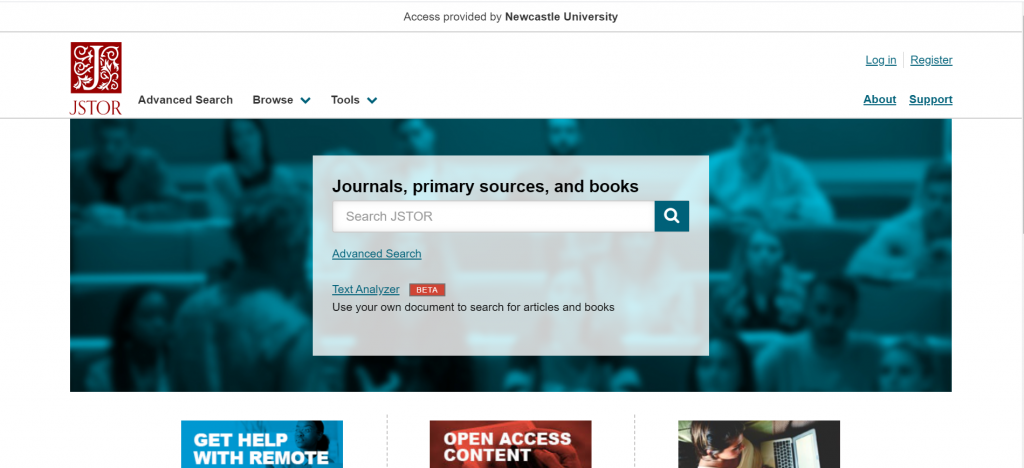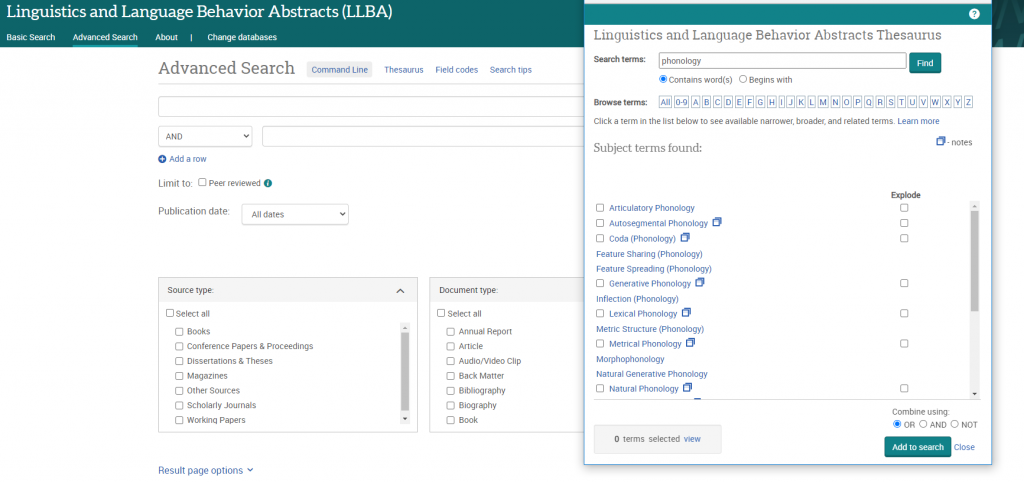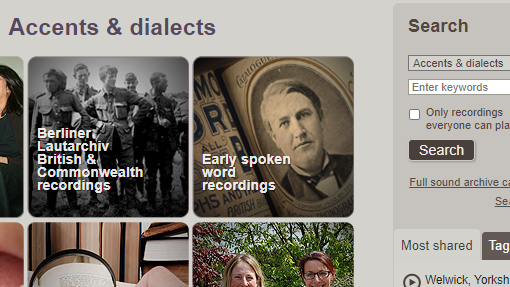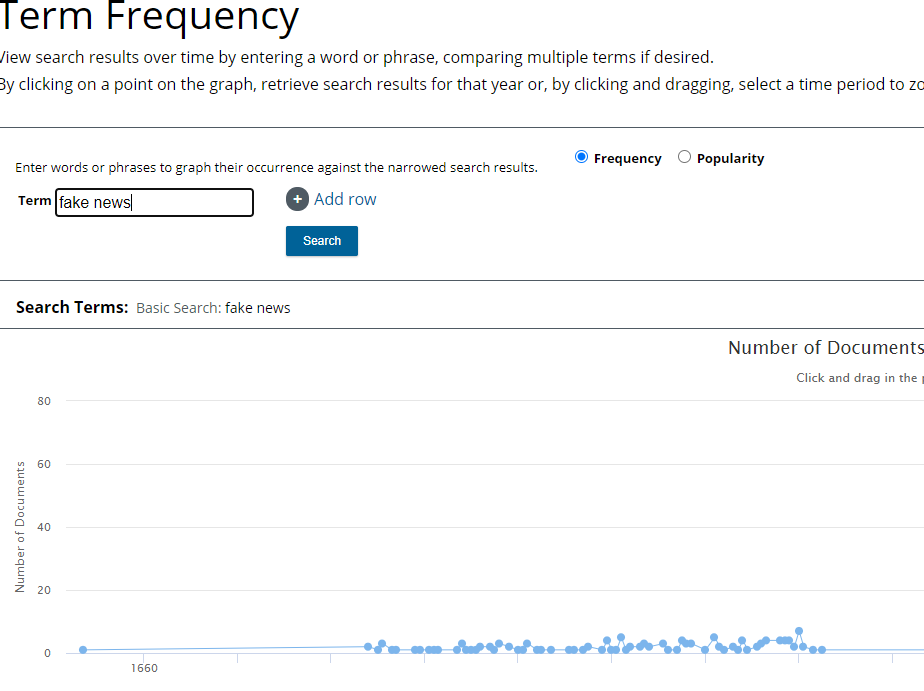The Library has lots of great collections and resources, so when it comes to finding wider reading for your topic or beginning research for your assignment or dissertation it might all seem a bit overwhelming. Library Search can be a great place to start looking for information but there are many other resources you might want to try. To help you get the best out of our resources we’ve put together this list of some of the most useful online databases and collections for the study of Language and Linguistics.
Let’s dive in!
Scopus
Scopus is a large, interdisciplinary database of peer-reviewed literature, providing an index of articles, book chapters, conference papers and trade publications.
One of the main advantages of using Scopus is that it provides a lot of useful information about the articles it indexes. This includes full reference lists for articles and cited reference searching, so you can navigate forward and backward through the literature to uncover all the information relevant to your research. You can also set up citation alerts, so you can be informed of new, relevant material automatically.
Scopus includes other smart tools that can help you track and visualise the research in your area, including author and affiliation searching, visual analysis of search results, a journal analyser, and author identifier tools. You’ll find tutorials and advice on using these features in the Scopus support centre and on their YouTube Channel.
JSTOR
JSTOR provides access to full-text materials including scholarly journals, books and book chapters in the arts, humanities, and social sciences. It has basic and advanced search options that allow you to search by topic keyword, author, subject area, title or publisher.
Take a look at our Get more out of JSTOR blog post to find tips for advanced searching on this database.

Linguistics and Language Behavior Abstracts (LLBA)
Linguistics and Language Behavior Abstracts is an excellent resource for those interested in the nature and use of language. The database focuses on academic resources for the study of language, including phonetics, phonology, morphology, syntax and semantics, and descriptive, historical, comparative, theoretical and geographical linguistics.
LLBA has the added advantage of including a specialised linguistics thesaurus, which you can use in advanced search to refine and focus your search. The thesaurus provides a searchable list of all the subject terms used in the database and highlights links between broader, narrower and related terms, helping you to select all of the keywords relevant to your topic.

ProQuest provide a helpful and detailed guide to LLBA which includes search tips for basic and advanced search as well as some sample searches you can work through to familiarise yourself with the database.
The Encyclopedia of Applied Linguistics
The Encyclopedia of Applied Linguistics is a comprehensive online reference work covering 27 key areas of the field, including Language Learning and Teaching, Bilingual and Multilingual Education, Assessment and Testing, Corpus Linguistics, Conversation Analysis, Discourse and Technology and Language. You’ll also find over 200 entries on the philosophy and history of applied linguistics and biographies of key applied linguists.
You can browse the Encyclopedia by topic or look for keywords using simple or advanced searches.
Accents and Dialects
Accents and Dialects is a searchable database of English accent recordings from the British Library Sound Archive. Recordings include early spoken word snippets from the 1890s onwards, Opie’s collection of children’s songs and games, an evolving English word bank, and a survey of English dialects. Each recording includes a detailed description, and some include additional linguistic descriptions too. Most recordings can be downloaded for academic use.
You can browse the database by project, county, or date. You can also use the search box on the top right of the page to look for specific keywords, including dialects or places.

The British Library have also developed an interactive timeline showing the evolution of the English language from the 11th Century to the present day. This requires Adobe Flash to view.
The Cambridge History of the English Language
The Cambridge History of the English Language is a six-volume work providing an authoritative account of the history of English; from Old English through to modern variations in Britain and overseas. Each volume gives a chronological overview of the data, links to scholarship in the area and considers the impact of current and developing linguistic theory on the interpretation of the data.
You can access volumes individually on Library Search or sign in via institutional login at the link above to browse all volumes together.
Historic Newspapers
The Library provides access to several million digitised pages of historic newspapers, dating from the seventeenth century. We have all UK broadsheet archives online (e.g. The Times, The Guardian, The Telegraph) as well as titles which are strong in arts and culture coverage, such as the Times Literary Supplement.
If you want to search across a range of historic new sources, start with Gale Primary Sources, as this gives access to all our British newspaper archives, except The Guardian and The Observer. Gale also has a useful tool called term frequency that allows you to track the history of particular words and phrases.

You’ll find an overview of all our News resources on our Newspaper Guide.
Box of Broadcasts (BoB)
Box of Broadcasts allows you to access TV and radio broadcasts from over 65 channels, including most of the UK’s Freeview network, all BBC TV and radio content from 2007, and several foreign language channels. It’s a great resource for finding documentaries or critical opinions.
You can view archived programmes, create clips and playlists, and see transcripts to help with citation and translation. You can also search other user’s public playlists to see curated lists around topics similar to your own. There are lots of helpful tutorial videos on the BoB website.
Unfortunately, Box of Broadcasts is not available outside the UK.
English Language and Linguistics Subject Guide
This list was just a taster of all the great resources available for your subject area, to access these and to find out more visit the English Language and Linguistics Subject Guide and explore the journals, databases and subject specific resources we’ve curated for students interested in this field of study.
There are also subject guides for specific languages which may be useful for you to explore, including Chinese and Japanese studies, German studies, French studies, Italian studies, and Spanish and Latin American studies.

